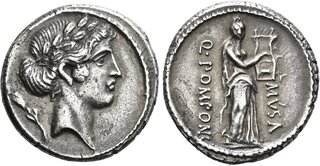| Numismatica Ars Classica > Auction 143 | Auction date: 7 May 2024 |
| Lot number: 271 Price realized: This lot is for sale in an upcoming auction - Bid on this lot  | Show similar lots on CoinArchives Find similar lots in upcoming auctions on |
| Lot description: The Dioscuri Collection. The Roman Republic. Q. Pomponius Musa. Denarius 66, AR 19 mm, 3.85 g. Laureate head of Apollo r.; behind, flower. Rev. Q·POMPONI – MVSA Erato standing r., playing square lyre. Babelon Pomponia 12. Sydenham 814. FFC 1037 (this coin). RBW –. Crawford 410/6. Extremely rare and undoubtedly among the finest specimens known. Perfectly struck and centred on a very large flan and with superb old cabinet tone. Extremely fine Ex Hirsch 11 May 1905, Barron, 810; M&M 53, 1977, 199; Lanz 100, 1998, Leo Benz, 584 and Aureo & Calicò 319, 2018, Alba Longa, 601 sales. In a recent article written by Phil Davies and published in the Festscrhif dedicated to Rick Witschonke, the author maintains, with convincing arguments, the issues showing on the reverse a muse holding a square lyre (kithara) should be identified as Erato, while those holding a turtle-shell lyre on reverse and having the turtle symbol on obverse should be identified as Terpsichore. This obviously makes the coin with Erato on reverse less rare than previously thought. Nevertheless the issue Crawford 410/6 remains an extremely rare type as Erato is playing the kithara whereas the type where she is holding the lyre in one hand and the kithara in the other is a much more common type. To consider this type as simply a die variety, as made by some cataloguers but not from Phil Davis, is in our view a mistake. Like the preceding piece, this denarius also belongs to the thematic series of Q. Pompnius Musa, but here the goddess depicted on the reverse is Erato (literally meaning "Lovely"), the Muse of lyric poetry-especially love songs. Like her sister Muses, she was a daughter of Zeus and Mnemosyne (Memory) and recognised Apollo as leader. Details of her mythology are very limited, but she was important enough to be invoked by name at the beginning of the lost Greek love poem, Rhadine, and by Virgil at the opening of Book 7 of the Aeneid. Estimate: 30000 CHF |  |



